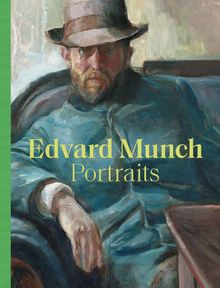| |||||||||||||||||||||||||
ARTIST MONOGRAPHS
|
|
in stock $45.00 Free Shipping UPS GROUND IN THE CONTINENTAL U.S. |
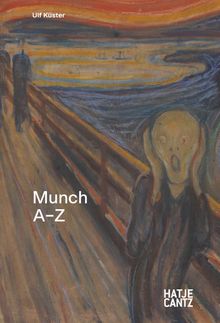 Edvard Munch: A–Z
Edvard Munch: A–Z
Published by Hatje Cantz.
By Ulf Küster.
Norwegian artist Edvard Munch (1863–1944) was one of the most significant painters of the early 20th century. He was responsible for such iconic paintings as The Scream (1893), that have since transcended art history and entered into popular culture. Munch made feelings and states of mind the subject of his painterly and graphic work. Using intense colors and expressive figuration, he created a highly individual artistic language that makes his oeuvre as enigmatic as it is appealing. Born in Norway, his travels took him to Paris and Berlin, where he cultivated contacts with important writers, artists, and intellectuals of the time. Across 26 short chapters, from "A for anxiety" to "G for ghosts," "R for revolvers" and "Z for zoo," this volume unpacks both familiar and surprising aspects of Munch's life and work.
PUBLISHER
Hatje Cantz
BOOK FORMAT
Hardcover, 5.25 x 7.75 in. / 120 pgs / 40 color.
PUBLISHING STATUS
Pub Date 10/28/2025
Active
DISTRIBUTION
D.A.P. Exclusive
Catalog: MID WINTER 2025 p. 23
PRODUCT DETAILS
ISBN 9783775759434 TRADE
List Price: $24.00 CAD $36.00
AVAILABILITY
In stock
in stock $24.00 Free Shipping UPS GROUND IN THE CONTINENTAL U.S. |
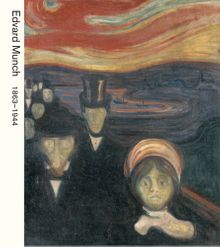 Edvard Munch 1863–1944
Edvard Munch 1863–1944
Published by Skira.
Edited with text by Birgitte Sauge, Mai Britt Guleng, Jon-Ove Steihaug.
Though The Scream is undoubtedly his best-known piece, Edvard Munch’s body of work extends far beyond this silent howl to encompass a wide practice across paint, pastel and print. The joint effort of ten scholars, and first published in 2013 to great acclaim, this volume offers a comprehensive survey of Munch’s inimitable contributions to modern art. The publication covers many aspects of Munch’s versatile artistic practice, with a focus on specific themes and phenomena that characterize his work. The texts offer a fresh look at Munch’s oeuvre in the context of modernism, highlighting the issues that the artist grappled with throughout his career: the relationship between art and reality, the artist and the public, and Munch’s misgivings about modernism and his place in the world. With a thorough bibliography, a timeline of the artist’s life, and excerpts of Munch’s own writing, this monograph proves to be a most comprehensive tribute to the artist.
Edvard Munch (1863–1944) was born in rural Norway before his parents moved to Oslo (then called Kristiana). He grew up under the influence of frequent family illness, both mental and physical, and would later use his art as a means of expressing his turbulent psychological state. He studied at the Royal School of Art and Design in Oslo and spent time in Paris and Berlin. Most of his work managed to survive the Nazi purges of “degenerate art.”
PUBLISHER
Skira
BOOK FORMAT
Paperback, 10 x 11 in. / 368 pgs / 355 color.
PUBLISHING STATUS
Pub Date 7/13/2021
Out of stock indefinitely
DISTRIBUTION
D.A.P. Exclusive
Catalog: SPRING 2021 p. 30
PRODUCT DETAILS
ISBN 9788857244853 TRADE
List Price: $50.00 CAD $70.00
AVAILABILITY
Not available
STATUS: Out of stock indefinitely. |
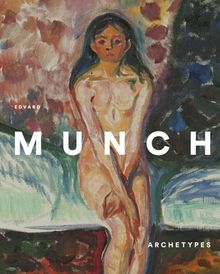 Edvard Munch: Archetypes
Edvard Munch: Archetypes
Published by Museo Thyssen-Bornemisza.
Text by Paloma Alarcó, Patricia G. Berman, Jon-Ove Steihaug.
Edvard Munch: Archetypes brings together a thematic selection of 80 works -- in full-page, museum-quality reproductions -- that examine the painter’s long and prolific career and reveal his ability to synthesize the obsessions of modern humanity. This is the first book to emphasize the wide spectrum of emotional archetypes through which Munch reveals various existential obsessions such as love, desire, jealousy, angst and death, and states of mind including melancholy, passion and submission. Each section of the volume is structured around these archetypes, showing the representation of the human figure in various settings: the seaside, the sickroom, the 'green room,' the woods, the night and the artist’s studio. It combines early works with late versions and paintings with graphic works so as to underscore the thematic and existential circularity of Munch’s oeuvre.
The art of Edvard Munch (1863–1944), who is today considered one of the forefathers of modern art along with Cézanne, van Gogh and Gauguin, developed from a distinctive blend of tradition and experimentation. From the beginnings of his career, the Norwegian artist created a particular mythology for modern times that was in close step with the art, literature and thought of his contemporaries. His aesthetic language, which evolved from Symbolism to Expressionism, deployed various strategies to construct a pictorial narrative of the most universal subjects.
Edvard Munch (1863–1944) was born in Løten, Norway, and studied design and art in Oslo. In May of 1885 he traveled to Paris on a scholarship, and after the deaths of his sister and father the following year, he began to spend most of his time in France. His painting first achieved fame with an 1892 exhibition in Berlin, which also led directly to his influence upon the German Expressionists. Despite struggles with alcohol and mental health, Munch lived to the age of 80.
PUBLISHER
Museo Thyssen-Bornemisza
BOOK FORMAT
Hardcover, 9 x 11 in. / 232 pgs / 156 color / 23 bw.
PUBLISHING STATUS
Pub Date 2/23/2016
Out of stock indefinitely
DISTRIBUTION
D.A.P. Exclusive
Catalog: SPRING 2016 p. 77
PRODUCT DETAILS
ISBN 9788415113737 TRADE
List Price: $75.00 CAD $99.00 GBP £65.00
AVAILABILITY
Not available
STATUS: Out of stock indefinitely. |
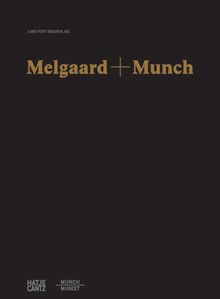 Melgaard & Munch
Melgaard & Munch
Published by Hatje Cantz.
Edited by Lars Toft-Eriksen. Text by Patricia G. Berman, David Lomas, Oystein Sjastad, Lars Toft-Eriksen.
PUBLISHER
Hatje Cantz
BOOK FORMAT
Hardcover, 7.75 x 11.5 in. / 256 pgs / 200 color.
PUBLISHING STATUS
Pub Date 5/26/2015
Out of print
DISTRIBUTION
D.A.P. Exclusive
Catalog: SPRING 2015 p. 152
PRODUCT DETAILS
ISBN 9783775739511 TRADE
List Price: $60.00 CAD $79.00
AVAILABILITY
Not available
STATUS: Out of print | 00/00/00 For assistance locating a copy, please see our list of recommended out of print specialists |
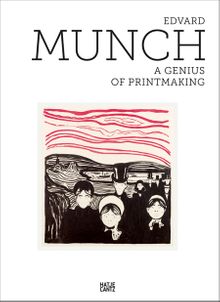 Edvard Munch: A Genius of Printmaking
Edvard Munch: A Genius of Printmaking
Published by Hatje Cantz.
Text by Gerd Woll.
Edvard Munch (1863–1944) was born in Loton, Norway, and studied design and art in Oslo. In May of 1885 he traveled to Paris on a scholarship, and after the deaths of his sister and father the following year, he began to spend most of his time in France. His painting first achieved fame--or notoriety--with an 1892 exhibition in Berlin, which also led directly to his influence upon the German Expressionists. Despite struggles with alcohol and mental health, Munch lived to the age of 80.
PUBLISHER
Hatje Cantz
BOOK FORMAT
Hardcover, 9.5 x 12.5 in. / 208 pgs / 224 color.
PUBLISHING STATUS
Pub Date 2/28/2014
Out of print
DISTRIBUTION
D.A.P. Exclusive
Catalog: SPRING 2014 p. 56
PRODUCT DETAILS
ISBN 9783775737012 TRADE
List Price: $70.00 CAD $85.00
AVAILABILITY
Not available
STATUS: Out of print | 00/00/00 For assistance locating a copy, please see our list of recommended out of print specialists |
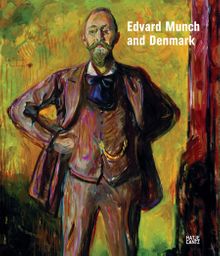 Edvard Munch and Denmark
Edvard Munch and Denmark
Published by Hatje Cantz.
Edited by Dieter Buchhart. Text by Anne-Brigite Fonsmark, Gerd Woll, Gry Hedin.
PUBLISHER
Hatje Cantz
BOOK FORMAT
Clth, 10 x 11.5 in. / 120 pgs / 93 color / 57 bw.
PUBLISHING STATUS
Pub Date 3/31/2010
Out of print
DISTRIBUTION
D.A.P. Exclusive
Catalog: SPRING 2010 p. 67
PRODUCT DETAILS
ISBN 9783775724760 TRADE
List Price: $45.00 CAD $55.00
AVAILABILITY
Not available
STATUS: Out of print | 00/00/00 For assistance locating a copy, please see our list of recommended out of print specialists |
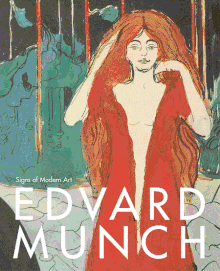 Edvard Munch: Signs of Modern Art
Edvard Munch: Signs of Modern Art
Published by Hatje Cantz.
Edited by Dieter Buchhart. Text by Oivind Storm Bjerke, Ulf Küster, Philippe Büttner.
PUBLISHER
Hatje Cantz
BOOK FORMAT
Hardcover, 9.5 x 12 in. / 288 pgs / 258 color.
PUBLISHING STATUS
Pub Date 7/1/2007
Out of print
DISTRIBUTION
D.A.P. Exclusive
Catalog: FALL 2007 p. 20
PRODUCT DETAILS
ISBN 9783775719131 TRADE
List Price: $65.00 CAD $75.00
AVAILABILITY
Not available
STATUS: Out of print | 5/1/2009 For assistance locating a copy, please see our list of recommended out of print specialists |
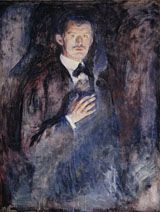 Edvard Munch: The Modern Life of the Soul
Edvard Munch: The Modern Life of the Soul
Published by The Museum of Modern Art, New York.
Edited by Kynaston McShine. Essays by Patricia Berman, Reinhold Heller, Elizabeth Prelinger and Tina Yarborough.
PUBLISHER
The Museum of Modern Art, New York
BOOK FORMAT
Clothbound, 9 x 12 in. / 232 pgs / 200 color / 60 bw.
PUBLISHING STATUS
Pub Date 2/1/2006
Out of print
DISTRIBUTION
D.A.P. Exclusive
Catalog: SPRING 2006 p. 2
PRODUCT DETAILS
ISBN 9780870704550 TRADE
List Price: $60.00 CAD $70.00
AVAILABILITY
Not available
STATUS: Out of print | 00/00/00 For assistance locating a copy, please see our list of recommended out of print specialists |
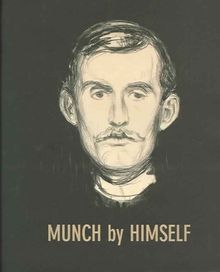 Munch by Himself
Munch by Himself
Published by Royal Academy Publications.
Text by Iris Müller-Westermann.
PUBLISHER
Royal Academy Publications
BOOK FORMAT
Cloth, 9.75 x 10.5 / 206 pgs / Illustrated throughout
PUBLISHING STATUS
Pub Date 4/20/2005
Out of print
DISTRIBUTION
D.A.P. Exclusive
Catalog: Publisher Backlist
PRODUCT DETAILS
ISBN 9781903973646 TRADE
List Price: $65.00 CAD $97.50
AVAILABILITY
Not available
STATUS: Out of print | 00/00/00 For assistance locating a copy, please see our list of recommended out of print specialists |
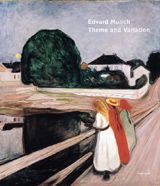 Edvard Munch: Theme And Variation
Edvard Munch: Theme And Variation
Published by Hatje Cantz.
Artwork by Edvard Munch. Contributions by Klaus Albrecht Schröder. Text by Christoph Asendorf, Marian Bisanz-Prakken, Dieter Buchhart, Antonia Hoerschelmann, Frank Høifødt, Iris Müller-Westermann, Gerd Woll.
PUBLISHER
Hatje Cantz
BOOK FORMAT
Clothbound, 9.75 x 11.5 in. / 416 pgs / 272 color / 6 bw
PUBLISHING STATUS
Pub Date 5/2/2003
Out of print
DISTRIBUTION
D.A.P. Exclusive
Catalog: SPRING 2003
PRODUCT DETAILS
ISBN 9783775712705 TRADE
List Price: $75.00 CAD $90.00
AVAILABILITY
Not available
STATUS: Out of print | 12/19/2005 For assistance locating a copy, please see our list of recommended out of print specialists |
